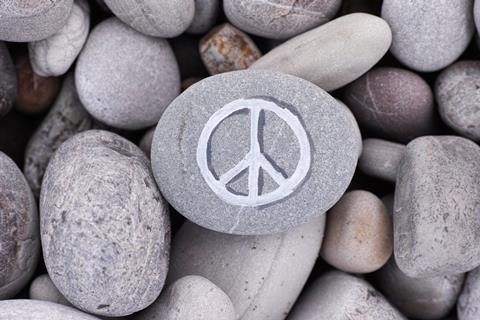Cathy Madavan shares what she strives to do in all her relationships to cultivate unity and peace

It would be nice to waft through life with an abundance of fabulous friendships, supportive family and meaningful and fulfilling work relationships. It would be wonderful to never feel lonely, and to have a bulging diary of social events with people you love. And it would be extra fantastic if this all came without any conflict, betrayal, friendship FOMO (Fear Of Missing Out) or hurt, wouldn’t it? But relationships are complicated and the need for unity is a recurring theme in scripture for a reason. There is much to be said on this subject, but here are five things I have been pondering about being a peacemaker against the odds.
1. Peacemaking is not peacekeeping
There are people who will do almost anything to keep the peace. They avoid conflict at all costs and desperately try to people-please. Their drive to be liked overrules almost everything else. We’ve probably all fallen into this trap to a greater or lesser extent. I certainly have. But peace is not just the absent of conflict; peace is about agreement, unity and harmony. Peacemaking takes intentionality and a determination to aim at the right thing together. And (newsflash) it might not please everybody all the time. In fact, Jesus, the personification of divine reconciliation, definitely did not please everybody with everything he said or did. Now that’s worth pondering.
2. Honest communication costs
I’ve learned this one the hard way again over the last couple of years. Being vulnerable is brave, isn’t it? If we want to live in peace we must trust people, but trust takes years to earn and can be lost in a moment. Sometimes trust and transparency pay huge dividends and you end up with beautiful relationships. Sometimes you end up hurt. But living in superficial pretence or avoiding honest communication is not the answer. It might be costly to be vulnerable, but it is the price of loving and cultivating meaningful relationships.
3. Boundaries are OK

I came to the startling realisation a while ago that not everybody has to be my best friend or have access to the inner workings of my soul (I’m a slow learner). Not everyone is safe, and, on a very basic level, I just don’t have the time to invest the same into every relationship. Doing my best to live at peace with everybody does not mean living at the same pace with everybody. Yes we should extend love, grace and hospitality as much as possible, but we also have permission to cultivate deeper relationships with a few people. Jesus loved indiscriminately but spent most time with the few closest to him. That’s healthy.
4. There is always ‘One Fact More’
Over the last 18 years, my husband has served as senior pastor at a church, and he often talked about OFM – or ‘One Fact More’. We recently left the church and received a goodbye book of messages and dozens of cards, many of whom referred to the power of this phrase. It clearly resonated with people. The truth is, there is always one fact more when it comes to other people; one more piece of information that might transform your perception of them; one extra factor that would explain their unusual behaviour. It pays to show grace to others in the way you’d like grace to be given to you. There is often more to the story than you know. Always think…OFM.
5. Your history is not your destiny
It is rather frustrating, but the truth remains: the only person you ever have any real power over is you. When navigating any relationship, you can decide to be honest, to be transparent, to make wise choices, to get good advice, to pray and to seek God’s guidance, but (annoyingly) you can’t make the other person do the same. You can decide to walk painful places of conflict, misunderstanding and betrayal with grace and dignity, choosing to do what you know is right. Others might choose a different path. Thank God that he always honours those who honour him. More than anything, we want to live with the peace that “transcends all understanding” (Philippians 4:7), which only comes from our heavenly Father.































